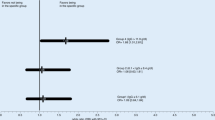Abstract
Objectives: To assess the prognostic value of determining anti-endotoxin core antibodies (EndoCab) immunoglobulin (Ig)G and IgM in medical patients with sepsis syndrome in order to identify patient subgroups that may profit from endotoxin-neutralizing therapy. The findings were correlated with clinical outcome, endotoxin levels and sepsis score. Design: Cohort study with a follow-up period of 30 days. Setting: Medical intensive care units (2) of a university hospital. Patients and methods: Twenty-nine patients who fulfilled the criteria of sepsis syndrome and did not present with septic shock or had not been treated with antibiotics for more than 3 days were included in the study. Twenty-one intensive care patients without infections served as controls for antibody concentrations. Interventions: Blood samples were obtained from indwelling arterial catheters or direct venipuncture on admission and daily thereafter until transfer to a regular unit. Sepsis scores were determined daily. Results: The mortality rate at 30 days was 44.8 % (13 out of 29). Sepsis patients had significantly lower initial EndoCab IgM and IgG concentrations than controls. Initial EndoCab IgG concentrations were significantly lower in non-survivors of sepsis syndrome but not in survivors compared to controls (median concentrations 51.5 vs 110.1 vs 245.4 MU/ml). EndoCab IgM and IgG were lower in non-survivors compared to survivors, though that difference failed to reach significance (p = 0.11 in both cases). Depletion of initial EndoCab IgM concentrations (defined as a value below the 10th percentile of a control population) was present in 15 patients, 9 of whom died, and depletion of IgG in five patients, four of whom died. EndoCab IgM and IgG concentrations rose concordantly in survivors and non-survivors in the course of the disease. Endotoxin levels were significantly higher in non-survivors compared to controls but not in survivors. A sepsis score of 21 and higher was associated with 90.9 % mortality (specificity 93.8 %, sensitivity 76.9 %). Conclusions: Decreased EndoCab IgG concentrations are associated with increased mortality in medical patients with sepsis syndrome. The measurement of initial anti-endotoxin antibodies may provide a useful tool to identify septic patients who profit potentially from endotoxin neutralizing therapy, however considerable overlap of antibody concentrations warrants additional parameters. The sepsis score is easy to determine and useful in the evaluation of medical patients with sepsis.
Similar content being viewed by others
Author information
Authors and Affiliations
Additional information
Received: 4 September 1998 Final revision received: 28 December 1998 Accepted: 15 February 1999
Rights and permissions
About this article
Cite this article
Strutz, F., Heller, G., Krasemann, K. et al. Relationship of antibodies to endotoxin core to mortality in medical patients with sepsis syndrome. Intensive Care Med 25, 435–444 (1999). https://doi.org/10.1007/s001340050877
Issue Date:
DOI: https://doi.org/10.1007/s001340050877




